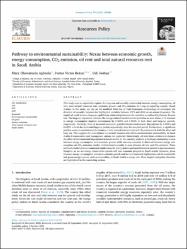| dc.contributor.author | Agboola, Mary Oluwatoyin | |
| dc.contributor.author | Bekun, Festus Victor | |
| dc.contributor.author | Joshua, Udi | |
| dc.date.accessioned | 2023-08-10T19:43:05Z | |
| dc.date.available | 2023-08-10T19:43:05Z | |
| dc.date.issued | 2021 | en_US |
| dc.identifier.issn | 0301-4207 | |
| dc.identifier.issn | 1873-7641 | |
| dc.identifier.uri | https://hdl.handle.net/11363/5239 | |
| dc.description.abstract | This study aims to empirically explore the long-run and causality relationship between energy consumption, oil
rent, total natural resources rent, economic growth, and CO2 emission for a top oil-exporting country (Saudi
Arabia). In this study, we rely on the modified Wald test of Toda-Yamamoto methodology to investigate the
direction of causality between the highlighted variables between 1971 and 2016 on an annual frequency. The
empirical result shows a long-run equilibrium relationship between the variables as outlined by Pesaran Bounds
test. The long-run regression validates the energy-induced environmental pollution as seen where a 1% increase
in energy consumption depletes environment by 0.360% and 0.983% in both short and long-run periods,
respectively. Similarly, there is increased economic growth-induced environment degradation by 0.952% and
0.625% in both the short and long-run period, respectively, over the sampled period. Furthermore, a significant
positive nexus is seen between the country’s’ total natural resource rent and CO2 emissions in both the short and
long run. This suggests the over-reliance on natural resource rent affects environmental sustainability in Saudi
Arabia if conservation and management options are neglected. Interestingly, oil rent shows evidence to dampen
the effect of environmental degradation in Saudi Arabia. In the causality analysis, a feedback relationship is seen
between energy consumption and economic growth while one-way causality is observed between energy consumption and CO2 emission; similar unidirectional causality is seen between oil rent and CO2 emission. These
outlined results have environmental implications for policy makers and practitioners to present a macroeconomic
blueprint, as we see energy conservative agenda will hurt economic progress in Saudi Arabia. However, given
increase, energy consumption increases economic growth and its environmental implications call for sustainable
and green energy sources, such as renewables, in Saudi Arabia’s energy mix. More insights and policy direction
are highlighted in the concluding section. | en_US |
| dc.language.iso | eng | en_US |
| dc.publisher | ELSEVIER SCI LTD, THE BOULEVARD, LANGFORD LANE, KIDLINGTON, OXFORD OX5 1GB, OXON, ENGLAND | en_US |
| dc.relation.isversionof | 10.1016/j.resourpol.2021.102380 | en_US |
| dc.rights | info:eu-repo/semantics/openAccess | en_US |
| dc.rights | Attribution-NonCommercial-NoDerivs 3.0 United States | * |
| dc.rights.uri | http://creativecommons.org/licenses/by-nc-nd/3.0/us/ | * |
| dc.subject | Environmental sustainability | en_US |
| dc.subject | Oil price | en_US |
| dc.subject | Carbon reduction | en_US |
| dc.subject | Total natural resources rent | en_US |
| dc.subject | Saudi Arabia | en_US |
| dc.title | Pathway to environmental sustainability: Nexus between economic growth, energy consumption, CO2 emission, oil rent and total natural resources rent in Saudi Arabia | en_US |
| dc.type | article | en_US |
| dc.relation.ispartof | Resources Policy | en_US |
| dc.department | İktisadi İdari ve Sosyal Bilimler Fakültesi | en_US |
| dc.authorid | https://orcid.org/0000-0003-4948-6905 | en_US |
| dc.authorid | https://orcid.org/0000-0002-7862-0547 | en_US |
| dc.identifier.volume | 74 | en_US |
| dc.identifier.startpage | 1 | en_US |
| dc.identifier.endpage | 8 | en_US |
| dc.relation.publicationcategory | Makale - Uluslararası Hakemli Dergi - Kurum Öğretim Elemanı | en_US |
| dc.contributor.institutionauthor | Bekun, Festus Victor | |



















